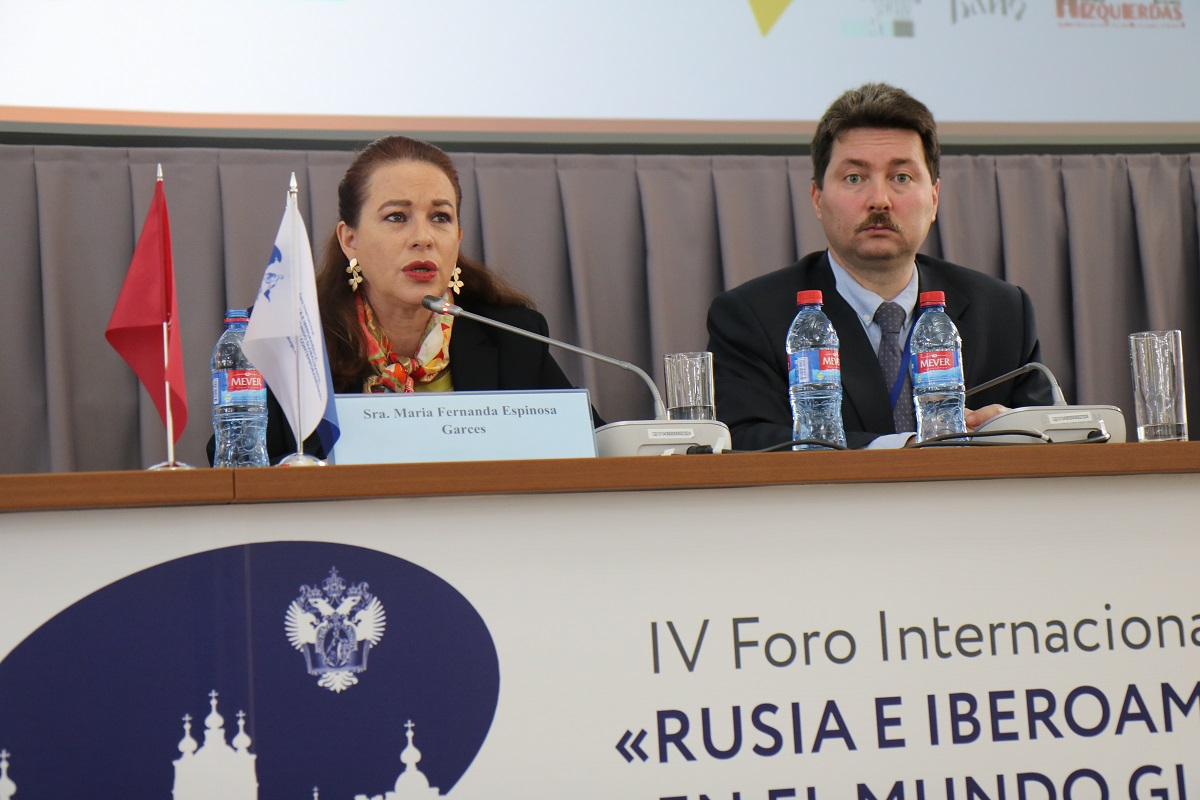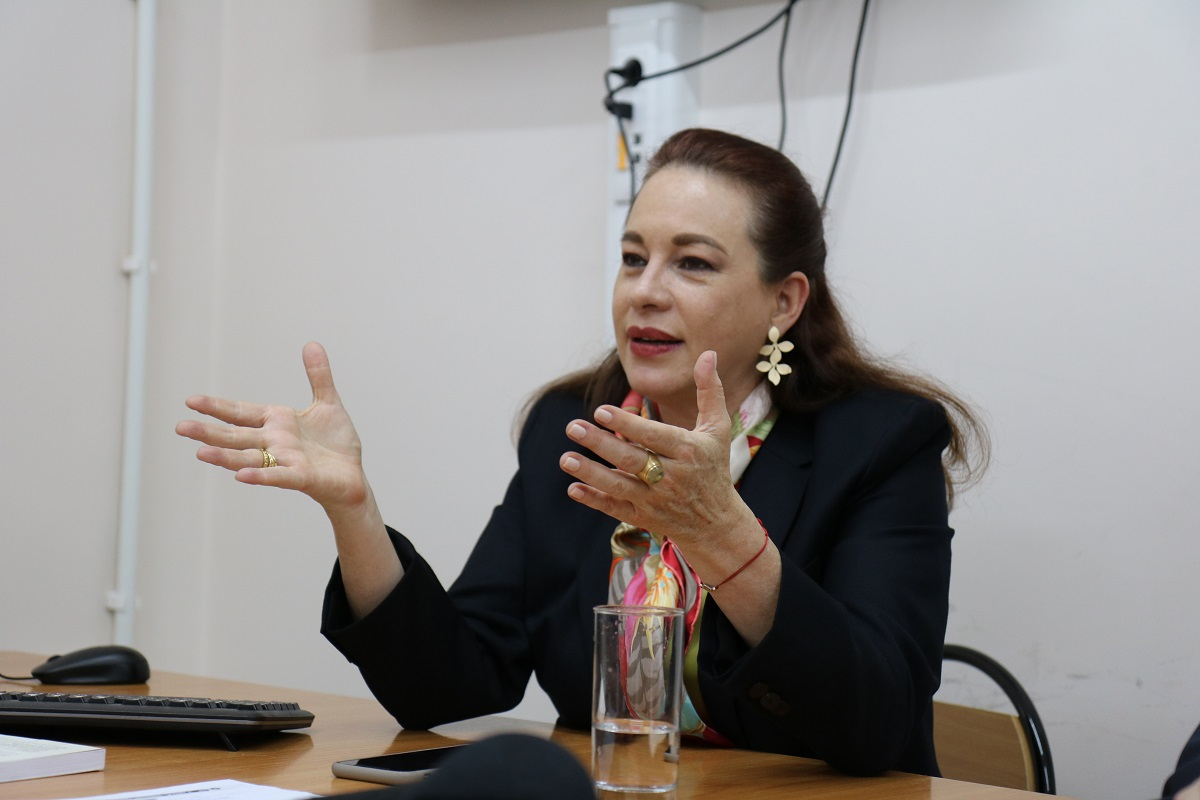María Espinosa: ‘In the game of globalisation millions of people have been washed overboard’
María Fernanda Espinosa Garcés, President of the 73rd session of the United Nations General Assembly, has delivered a public lecture at St Petersburg University. She spoke about her work as the head of the General Assembly and the major challenges that the world faces today: the climate crisis and military conflicts, poverty and unemployment. María Espinosa also mentioned the need for reform and renewal of the United Nations structure.
The event was held as part of the 4th International Forum ‘Russia and Ibero-America in a Globalizing World: History and Modernity,’ which took place at the University from 1 to 3 October.
The lecture by María Espinosa was dedicated to multilateralism and the contribution of the United Nations (UN) to its implementation. Multilateralism, or multilateral international cooperation, refers to organising relations between states in which each country is given privileges. In other words, it refers to an equitable partnership among a few countries. ‘The world is facing a confluence of crises, and it is very important to reintroduce a multilateral agenda and emphasise the role of multilateralism. The United Nations may not be the ideal platform for states to work together, as we also have our drawbacks. Yet, the UN is undoubtedly the world centre of multilateralism. Unilateral approaches, the use of force that we are witnessing at present, are the antithesis of the principle on which the UN was based. It is necessary to see the problems of all representatives of the world community. It is the only way for us to find suitable answers. This is obvious: we do need to make the world more peaceful and non-militarised, and less unequal,’ emphasised María Espinosa.
Every year, the President elect of the General Assembly, María Espinosa explained, chooses a theme for their work. She chose the theme of relevance. ‘I would like to ensure that the UN is relevant to all countries, so that a policy of equality and sustainability may be adopted everywhere. The UN exists to respond to challenges, to the needs of vulnerable countries and segments of the population. We must transform people’s lives for the better,’ said María Espinosa.
According to María Espinosa, many of the issues that we face today were caused by the processes of globalisation – not everyone benefits from it. ‘It is obvious that in the so-called game of globalisation millions of people have been washed overboard and left in a state of frustration and fear. So many people across the globe fear the future. Young people fear unemployment and insecurity, and worry about accessibility and affordability of health services. It is not infrequent that people are scared of terrorism, war and the climate crisis,’ she stressed.
One of the paradoxes mentioned by María Espinosa is that the world community knows the problems it faces. We study them and attempt to deal with them. We may even have the technology to solve them – for instance, to prevent climate change – but we fail to overcome them.
If we have both the data and the technology, why do we fail to take proactive steps to reverse the crises? And how can we explain this paradox to people?
María Fernanda Espinosa Garcés, President of the 73rd session of the UN General Assembly
As María Espinosa noted, climate change is one of the major obstacles to eradicating poverty and indigence in the world – as much as armed conflicts. Also, since World War II, the number of people in areas of war and armed conflict has reached an unprecedented dangerous level. In 2018, this figure amounted to 70 million people. Not only does such a situation lead to a rise in refugee flows, but also to poverty exacerbation in the world. And more importantly, María Espinosa is certain that issues such as climate change and conflict prevention should not be addressed unilaterally.
In her opinion, such paradoxes cause distrust towards state institutions, while states cease to be real representatives of the interests of society.
On the one hand, we see people’s fears and hopes, and on the other, we have the responses of institutions. States are failing to communicate with their citizens. People do not feel represented, they feel unsafe. People doubt that they will be helped in overcoming their fears and in solving the problems.
María Fernanda Espinosa Garcés, President of the 73rd session of the UN General Assembly
According to María Espinosa, the principle of multilateralism as a basis for interaction between countries is not widely discussed – and this is not right. Besides, María Espinosa believes that the UN as an institution needs to be reformed. And this process is already underway. ‘The deficit is observed not only in communication, but also in reforms. The UN is being revitalised. We want to change, reform the structure of our organisation, and make it more efficient. Once again we develop tools and working methods for our parliament. Still, this is a very long and complex process,’ added María Espinosa.
In conclusion, María Espinosa emphasised that it is necessary to confront the forces that seek to weaken the multilateral agenda. Moreover, it is vital that young people actively participate in this. According to María Espinosa, the UN plays the core role in this work.
I have heard an opinion shared by many young people that the UN is a ‘talk shop’ – a place where people talk. But I believe that dialogue and an opportunity to talk to each other are of utmost importance. There ought to be a place, a world centre that will promote dialogue and cooperation, so that our world may become better and better, with more solidarity and justice in it.
María Fernanda Espinosa Garcés, President of the 73rd session of the UN General Assembly
María Espinosa added that the forum ‘Russia and Ibero-America in a Globalizing World: History and Modernity’ has become a prestigious platform for debate and analysis of what is happening in Latin America and the Caribbean, as well as for discussion of the prospects of Russian and Ibero-American cooperation. ‘I am glad to see so many students, young people who are interested in these issues. I feel really privileged to be here – in the place where great scientists, thinkers and educators worked and studied. At the forum, I have seen a discerning, in-depth analysis of a variety of topics,’ said María Espinosa.
For reference, apart from a political and diplomatic career, María Espinosa is a recognised poet. As part of her participation in the forum, she donated several of her books to the M. Gorky Scientific Library of St Petersburg University. These included an anthology of works written over several years and the latest collection of poems ‘Geografías torturadas’ (‘Tortured geographies’), as well as a small collection of poems translated into the Russian language.
María Fernanda Espinosa Garcés presided over the 73rd session of the UN General Assembly in 2018–2019. She became the fourth woman and the first Latin American woman ever to hold the office. The visit to attend the forum ‘Russia and Ibero-America in a Globalizing World: History and Modernity’ was her first overseas trip after resigning from office in September 2019.



